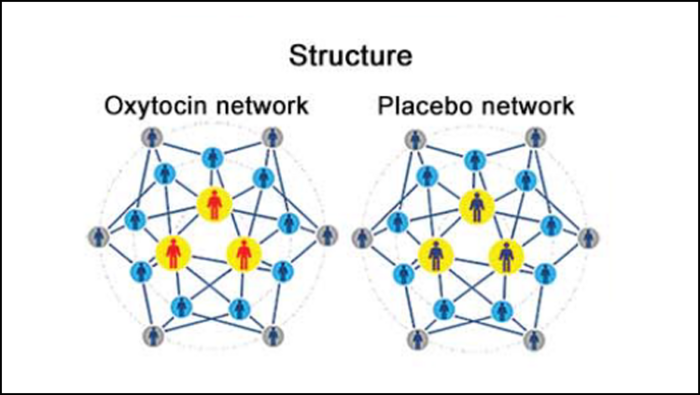Administering oxytocin to the central members of a social network spreads cooperation via increased punishment of uncooperative behavior, according to new research published in JNeurosci.

Credit: Li et al., JNeurosci 2022
Administering oxytocin to the central members of a social network spreads cooperation via increased punishment of uncooperative behavior, according to new research published in JNeurosci.
Large groups of people cannot peacefully coexist without cooperation — more social and cooperative people tend to end up as leaders in formal organizations and informal social groups. Yet cooperation can conflict with individual goals. Oxytocin, known for its involvement in bonding, may explain how humans evolved the cooperation needed to live in groups.
Li et al. gave intranasal oxytocin or a saline placebo to participants who occupied the most influential, or central, role in artificial social networks. The participants played a series of virtual games with strangers. In one game, the central members received money from peripheral members and set a threshold for the minimum offer they’d accept. When the central members received oxytocin, cooperation spread through the network; after many rounds of the game, the offer and acceptance threshold evolved into a fifty-fifty split, a sign of cooperation. In another game, oxytocin increased the likelihood central members would choose to cooperate and then punish peripheral members for uncooperative behavior, which tracked with the group increase in cooperation. These results indicate cooperation from influential group members spreads to the rest of the group, likely through increased enforcement of social norms.
###
Paper title: Oxytocin and the Punitive Hub — Dynamic Spread of Cooperation in Human Social Networks
Please contact [email protected] for the full-text PDF and to join SfN’s journals media list.
About JNeurosci
JNeurosci, the Society for Neuroscience’s first journal, was launched in 1981 as a means to communicate the findings of the highest quality neuroscience research to the growing field. Today, the journal remains committed to publishing cutting-edge neuroscience that will have an immediate and lasting scientific impact, while responding to authors’ changing publishing needs, representing breadth of the field and diversity in authorship.
About The Society for Neuroscience
The Society for Neuroscience is the world’s largest organization of scientists and physicians devoted to understanding the brain and nervous system. The nonprofit organization, founded in 1969, now has nearly 37,000 members in more than 90 countries and over 130 chapters worldwide.
Journal
JNeurosci
DOI
10.1523/JNEUROSCI.2303-21.2022
Method of Research
Experimental study
Subject of Research
People
Article Title
Oxytocin and the punitive hub — Dynamic spread of cooperation in human social networks
Article Publication Date
27-Jun-2022




